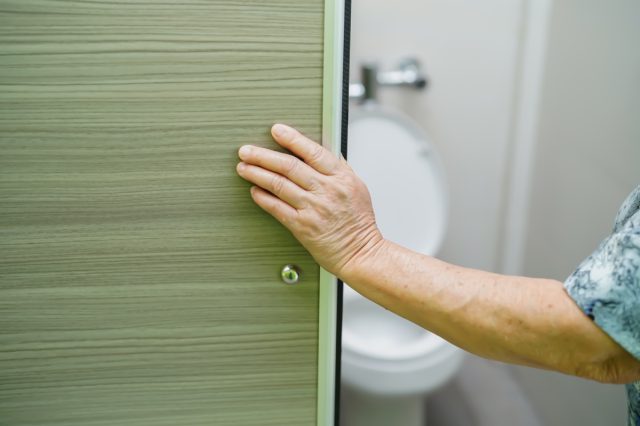These are the ‘7 Early Symptoms of Kidney Disease You Should Know, Doctors Say’ Kidney disease, also known as renal disease, is a condition in which the kidneys are damaged and cannot filter waste and excess fluids from the blood effectively. It is a serious condition that can lead to a number of serious health complications if left untreated.
EXPLORE: 10 Grocery Stores To Shop At During The Holidays
7 Early Symptoms of Kidney Disease You Should Know, Doctors Say
“The kidneys are responsible for removing wastes, toxins and extra water from the body; balancing important salts and minerals in the blood; and releasing hormones to help control blood pressure, manage anaemia and help maintain strong bones,” says Johns Hopkins. “The waste and extra water removed by the kidneys become urine. The urine flows through tubes called ureters. It goes to your bladder, which stores the urine until you go to the bathroom.” When the kidneys are damaged, they can’t filter blood as they should. The result can be a build-up of wastes in your body, as well as other problems that can harm your health. The symptoms of kidney disease can vary depending on the severity of the condition and the underlying cause. Some common symptoms may include:
READ MORE: 1,000 Reasons To Eat A Plant-Based Diet In 2023

Kidney disease can cause swelling in the feet, ankles, and legs for a number of reasons. One reason is that when the kidneys are not functioning properly, they may not be able to remove excess fluid from the body effectively. This excess fluid can build up in the tissues, leading to swelling. Another reason is that kidney disease can cause an imbalance of electrolytes in the body. Electrolytes, such as sodium and potassium, help to regulate the balance of fluids in the body. When the balance is disrupted, fluid can accumulate in the tissues, leading to swelling. Kidney disease can also cause an accumulation of waste products in the body, which can lead to swelling.

Kidney disease can cause fatigue and weakness for several reasons. One reason is anemia, a condition in which there are not enough red blood cells to carry oxygen to the body’s tissues. The kidneys produce a hormone called erythropoietin, which helps the body to produce red blood cells. When the kidneys are not functioning properly, they may not produce enough erythropoietin, leading to anemia. Anemia can cause fatigue and weakness. Kidney disease can also cause an accumulation of waste products in the body. These waste products can interfere with the body’s energy metabolism and cause fatigue.
In addition, kidney disease can cause electrolyte imbalances, which can affect the body’s energy levels. Electrolytes, such as sodium and potassium, help to regulate the balance of fluids in the body. When the balance is disrupted, it can affect the body’s energy levels.

The kidneys are responsible for producing urine, and when they are not functioning properly, the amount of urine produced may be reduced. This is because the kidneys are responsible for filtering waste and excess fluids from the blood and removing them from the body through the urine. When the kidneys are damaged, they may not be able to filter the blood effectively, leading to a decrease in urine output.

Kidney disease can cause changes in the appearance of urine, including a change in color or consistency. One reason is that the kidneys are responsible for filtering waste products from the blood and removing them from the body through the urine. When the kidneys are damaged, they may not be able to filter the blood effectively, leading to an accumulation of waste products in the urine. This can cause the urine to change color or become cloudy or murky.
 ALSO READ: 4 Ways To Get Stronger Without Lifting Weights
ALSO READ: 4 Ways To Get Stronger Without Lifting WeightsThe accumulation of waste products in the body can cause nausea and vomiting. “At first, kidney disease is silent. Symptoms often don’t appear until the kidneys are badly damaged. Many people don’t have any symptoms until their kidney disease is advanced. Blood and urine tests are the only way to know if you have kidney disease,” says Johns Hopkins.

When the kidneys are not functioning properly, they may not be able to remove waste products from the blood effectively, leading to itching. Kidney disease can cause changes in the levels of certain hormones in the body, which can affect the skin and cause itching.

Kidney disease can cause fluid to accumulate in the lungs, leading to shortness of breath. Dyspnea is a term used to describe difficulty breathing or shortness of breath. It is a common symptom that can be caused by a variety of underlying conditions.
Dyspnea can range in severity from mild to severe and can be accompanied by other symptoms, such as chest pain, coughing, and wheezing.
There are several possible causes of dyspnea, including respiratory conditions, such as asthma and chronic obstructive pulmonary disease (COPD), cardiovascular conditions, such as heart failure and pulmonary embolism, and other conditions, such as kidney disease and anemia.

The accumulation of fluid in the lungs can cause chest pain. How to treat this disease? “Make an appointment with your doctor if you have signs or symptoms of kidney disease. Early detection might help prevent kidney disease from progressing to kidney failure. If you have a medical condition that increases your risk of kidney disease, your doctor may monitor your blood pressure and kidney function with urine and blood tests during office visits. Ask your doctor whether these tests are necessary for you,” says the Mayo Clinic. “Treatment for chronic kidney disease focuses on slowing the progression of kidney damage, usually by controlling the cause. But, even controlling the cause might not keep kidney damage from progressing. Chronic kidney disease can progress to end-stage kidney failure, which is fatal without artificial filtering (dialysis) or a kidney transplant.”
READ POST: 10 New Food Trends You Should Try in 2023

